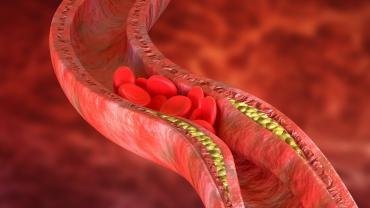
The inner lining of the blood vessels, also called the vascular endothelium, contains a protective gel-like layer that separates the tissue from circulating blood. This protective layer can be damaged or dysfunctional due to inflammation, certain dietary changes, smoking, and other lifestyle factors.
Endothelial dysfunction is caused by oxidative stress, increases in vascular reactive oxygen species production, and vascular inflammation. Endothelial dysfunction can then further trigger a cascade of changes that include: vasoconstriction, leukocyte infiltration, smooth muscle cell proliferation, and thrombocyte activation. Ultimately this results in physiological changes that have been linked to the development of atherosclerosis, hypertension, and other cardiovascular pathologies. Recent research suggests that certain micronutrients may help support the integrity of the vascular endothelium.
Resveratrol is a polyphenolic compound found in grape skin, dark berries, and peanuts. It acts to support antioxidative status and helps support the attenuation of monocyte adhesion to endothelial cells. It may also help promote vascular health by helping protect the endothelial glycocalyx. It may also help modulate autophagy, which may help restore homeostatic conditions during the aging process. Resveratrol may also help support the normal activity of inducible nitric oxide synthase and the inhibition of reactive oxygen species production.
In addition, pterostilbene, a structurally similar molecule to resveratrol, has been shown to help play a protective role against harmful changes in vascular smooth muscle cells and vascular endothelial cells. It may also support intercellular communication, liver health, and healthy metabolism. Pterostilbene has been shown in animal studies to help support healthy glucose metabolism, antioxidative status, and a healthy response to inflammation.
Dark berries also contain a group of bioactive phytonutrients called anthocyanins, a type of flavonoid, that have been shown in research to support antioxidative status and certain aspects of cardiovascular health. Evidence suggests that dark berries may help support arterial elasticity and endothelial function.
Omega-3 polyunsaturated fatty acids (PUFAs) have been shown to help protect vascular endothelial cells and support cardiovascular structural integrity. In animal studies, diets rich in n-3 PUFAs have observed increases in nitric oxide (NO) production and endothelial NO synthase expression. Increases in glutathione, superoxide dismutase, catalase, and guaiacol peroxidase activity have also been observed in the presence of n-3 PUFAs.
Magnesium may also promote endothelial health by stimulating local vasodilator mediators, including NO, and modulating endothelium-dependent and endothelium-independent vasodilation. Systematic reviews and meta-analyses have demonstrated an inverse association between magnesium intake and cardiovascular risk, including promoting normal blood pressure. Maintaining optimal vasculature relies on the body’s capacity to effectively respond to oxidative stress and inflammation within the endothelium. Several micronutrients and phytochemicals, such as magnesium, resveratrol, and n-3 PUFAs, may be useful for patients requiring additional vascular and endothelial support.
By Dr. Cory Ambrose, ND, MAT